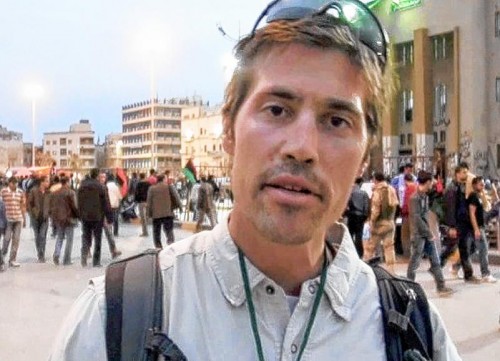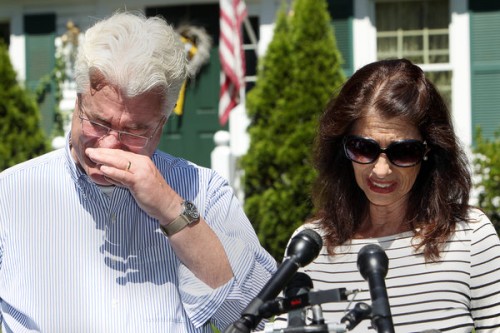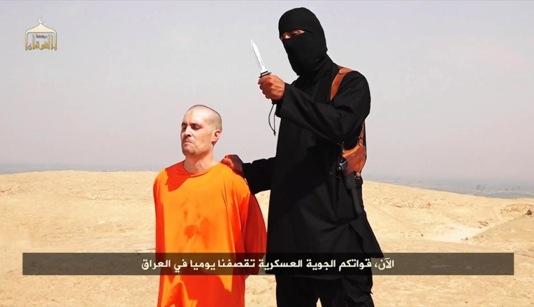
Kneeling in the dirt in a desert somewhere in the Middle East, James Foley lost his life this week at the hands of the Islamic State in Iraq and Syria. Before pulling out the knife used to decapitate him, his masked executioner explained that he was killing the 40-year-old American journalist in retaliation for the recent United States’ airstrikes against the terror group in Iraq.
In fact, until recently, ISIS had a very different list of demands for Mr. Foley: The group pressed the United States to provide a multimillion-dollar ransom for his release, according to a representative of his family and a former hostage held alongside him. The United States — unlike several European countries that have funneled millions to the terror group to spare the lives of their citizens — refused to pay.
The issue of how to deal with ISIS, which like many terror groups now routinely trades captives for large cash payments, is acute for the Obama administration because Mr. Foley was not the lone American in its custody. ISIS is threatening to kill at least three others it holds if its demands remain unmet, The New York Times has confirmed through interviews with recently released prisoners, family members of the victims and mediators attempting to win their freedom.
Sensitive to growing criticism that it had not done enough, the White House on Wednesday revealed that a United States Special Operations team tried and failed to rescue Mr. Foley — a New Hampshire native who disappeared in Syria on Nov. 22, 2012 — as well as the other American hostages during a secret mission this summer. Mr. Obama said the United States would not retreat until it had eliminated the “cancer” of ISIS from the Middle East.
ISIS also appears determined to increase the pressure on Washington. It has now threatened to kill a second of its hostages, Steven J. Sotloff, a freelance journalist for Time magazine who was being held alongside Mr. Foley.
In the video uploaded to YouTube on Tuesday, the screen goes dark after Mr. Foley is decapitated. Then the ISIS fighter is seen holding Mr. Sotloff in the same landscape of barren dunes, wearing an orange jumpsuit and his hands cuffed behind his back. “The life of this American citizen, Obama, depends on your next decision.”
Along with the three Americans, ISIS is holding citizens of Britain, which like the United States has declined to pay ransoms, former hostages confirmed. The terror group has sent a laundry list of demands for the release of the foreigners, starting with money but also prisoner swaps, including the liberation of Aafia Siddiqui, an M.I.T.-trained Pakistani neuroscientist with ties to Al Qaeda currently incarcerated in a prison in Texas. The policy of not making concessions to terrorists and not paying ransoms has put the United States and Britain at odds with other European allies, who have routinely paid significant sums to win the release of their nationals — including four French and three Spanish hostages who were released this year after money was delivered through an intermediary, according to two of the victims and their colleagues.
Kidnapping Europeans has become the main source of revenue for Al Qaeda and its affiliates, which have earned at least $125 million in ransom payments in the past five years alone, according to an investigation by The Times. Although ISIS was recently expelled from Al Qaeda and abides by different rules, recently freed prisoners said that their captors were well aware of what ransoms had been paid on behalf of European nationals held by Qaeda affiliates as far afield as Africa, indicating that they were hoping to abide by the same business plan.

While government and counterterrorism officials insist that paying ransoms only perpetuates the problem, the policy has meant that captured Americans have little chance of being released. A handful succeeded in running away, and even fewer were rescued in special operations. The rest are either held indefinitely — or else killed.
In an opinion article for Reuters, David Rohde, a columnist for the news service and a former foreign correspondent for The Times who was kidnapped by the Taliban, said that the uneven approach to ransoms may have cost Mr. Foley his life.
“The payment of ransoms and abduction of foreigners must emerge from the shadows. It must be publicly debated,” wrote Mr. Rohde, who escaped his yearlong custody of the Taliban only when he climbed out a window and freed himself. “American and European policy makers should be forced to answer for their actions.”
Mr. Foley, a freelance videographer and reporter for GlobalPost and Agence France-Presse, went missing 21 months ago in a town 25 miles south of the Turkish border. According to Nicole Tung, a close friend and fellow photojournalist, who gave an account of Mr. Foley’s activities before his capture, he had spent weeks in Syria documenting the country’s spiral into civil war, narrowly avoiding a falling tank shell. The normally calm reporter — who had come under fire in Afghanistan and had been kidnapped a year earlier in Libya — was rattled.
As the Thanksgiving holiday approached in 2012, he contacted Ms. Tung, and they made plans to meet for a few days across the border in Turkey. When Mr. Foley did not show up at the hotel at 5 p.m. as planned, Ms. Tung began calling his cellphone, finally reaching his translator.
The man explained that Mr. Foley had stopped at an Internet cafe to file his last images in Binesh, Syria. Soon after, armed men sped up behind his car and forced Mr. Foley out at gunpoint.
“I was sitting on the bed, in this depressing, dark hotel; the fact that the fixer answered the phone — when Jim was not answering his — was the cue that something had gone terribly wrong,” said Ms. Tung, who immediately contacted Mr. Foley’s family and editors.
Across the ocean at his home in Cambridge, Mass., the chief executive and co-founder of GlobalPost, Philip Balboni, reached for his Blackberry and had a terrible sense of foreboding: The email informing him of Mr. Foley’s abduction was almost an exact replay of the horror his staff had endured a year earlier, when Mr. Foley was kidnapped with three others by Col. Muammar el-Qaddafi’s forces in Libya.
“We had joked that we needed to take away his passport,” Mr. Balboni said Wednesday. “I don’t want to say it was déjà vu, but in a way, it was,” he added. “It just turns your life upside down — in one way, I knew what was coming, but I did not know the fullness of it.”
When he was executed this week, Mr. Foley became the second Western reporter to be killed by Islamic extremists since 2002, when Daniel Pearl, a Wall Street Journal reporter, was beheaded by a top Qaeda operative. Mr. Pearl’s murder was praised by a leading ideologue in a how-to manual that promoted the tactic of kidnapping foreigners. Since then, the terror network has turned to abducting Westerners to finance itself — seizing more than 50 foreigners in the past five years, almost all of whom were released after their governments paid sizable ransoms, according to a review of the known cases by The Times.
 However, in Iraq, where ISIS was founded, commanders grabbed foreigners for the sole purpose of killing them. Abu Musab al-Zarqawi, the leader of Al Qaeda in Iraq, became known as the “Sheikh of the Slaughterers” because he personally decapitated his foreign captives.
However, in Iraq, where ISIS was founded, commanders grabbed foreigners for the sole purpose of killing them. Abu Musab al-Zarqawi, the leader of Al Qaeda in Iraq, became known as the “Sheikh of the Slaughterers” because he personally decapitated his foreign captives.
He created his own execution style, forcing his victims to don orange jumpsuits — a mocking reference to prisoners held at the United States’ detention center in Guantánamo Bay, Cuba. So brutal, frequent and graphic were the killings that the then-No. 2 of Al Qaeda, Ayman al-Zawahri, wrote to Mr. Zarqawi advising him to quit the graphic executions and just shoot the prisoners instead.
Mr. Zarqawi’s Iraq-based fighters regrouped in Syria in 2011, where they eventually rebranded themselves as ISIS. Their tactics proved so brutal that Al Qaeda formally expelled them from the terror network this year.
However, in regard to kidnapping, ISIS’s tactics initially appeared to be in line with that of other Qaeda branches.
Before Mr. Foley was killed, his ISIS captors asked for a $100 million ransom, according to a representative of the family and a man held alongside Mr. Foley.
(The Foley family has not responded to requests for comment.)
Once the United States authorized airstrikes in Iraq this month, it appears that ISIS took a leaf out of the book of its founding father: They forced Mr. Foley to wear the telltale orange jumpsuit, and beheaded him on camera — a horrifying ode to the “Sheikh of the Slaughterers,” who himself was killed by United States forces in Iraq in 2006.
The eldest of five children from Rochester, N.H., Mr. Foley graduated from Marquette University in 1996 with a history degree. He joined Teach for America that year, working at an elementary school in Phoenix, officials with the organization said. In 2008, he earned a master’s degree from the Medill School of Journalism at Northwestern University.
“He was so clear on what he wanted to do,” said Ellen Shearer, a professor who taught Mr. Foley at Medill.
Unlike most freelancers who often take sizable risks without the safety net of an established news organization, Mr. Foley found a second family at GlobalPost, which paid a security firm millions of dollars to try to find him, Mr. Balboni said.
After his fortuitous release in Libya, GlobalPost brought him back to Boston, where he spent a stint as an editor, but it did not last long.“When you are touched by being in a war, you can’t get rid of it,” said Mr. Balboni, a veteran reporter as well as a former Vietnam War Army officer.
Mr. Foley was remembered by colleagues for his courage — to some a bravery that he took to its extreme. Yet at the time of his capture, Ms. Tung said, the tank shell explosion in Syria had spooked him, and he was looking for some time off. “It landed close enough to feel like it was time to get out,” she said.
His colleagues point to the remarkable bravery he displays in his final moments as a testament to the man he was: Looking straight at the camera, Mr. Foley’s face is concentrated. When the jihadist lifts the knife to his throat, and pulls his head back, he does not try to pull away.
NY Times

Leave a Reply
You must be logged in to post a comment.